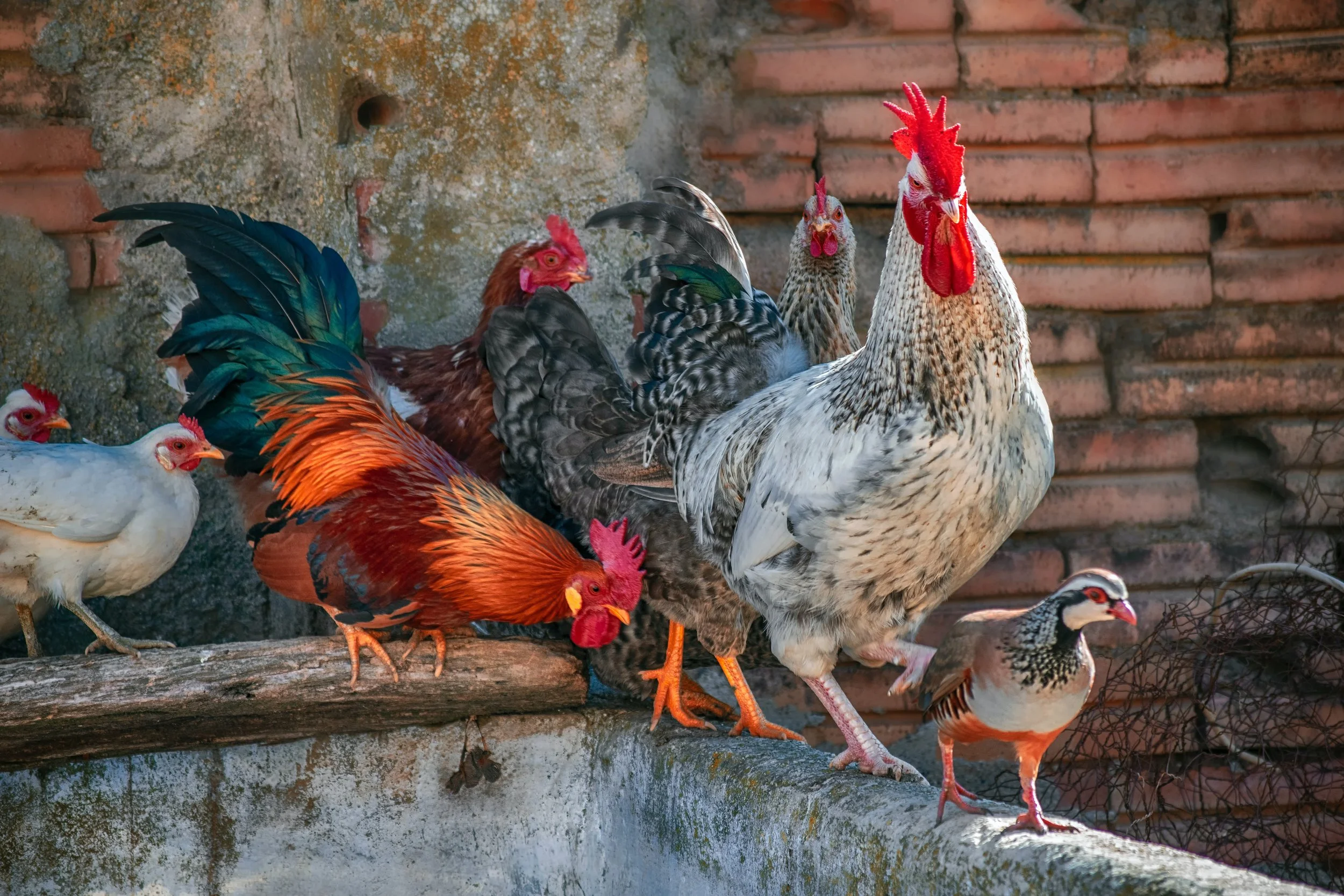Chickens Are Smarter Than You Think (And Science Can Prove It.)
Are you ready to question everything you thought you knew about chickens?
Research shows that chickens have much more impressive mental abilities than previously assumed,¹ and are capable of forming socially complex relationships. Below is some of what scientists have learned about chicken minds:
Diverse Vocabulary: Though most people know that chickens can make a clucking sound, studies have found that chickens actually can make at least 24 distinct sounds,² each in response to a specific situation. For example, when a chicken lays an egg, she loudly proclaims “buck-caw!” If a chicken senses a predator in the skies above, she shrieks to warn others. And roosters are known to alert female chickens and chicks when predators are nearby, but are more likely to remain silent if surrounded by other males.
Empathy: Scientists have also determined that chickens are capable of empathy toward other members of their species,³ and not only their offspring. Chickens have been documented to help hens who have lost their sight by following them around to make sure they are safe and even leaving worms for the blind hens to eat.
Counting: A study conducted in Italy found that young chicks just three to four days old are able to do simple math with numbers five and under.⁴ That’s something that even most humans cannot do until they are six or seven years old. The scientists concluded: “Results suggest impressive proto-arithmetic capacities in the young and relatively inexperienced chicks.”⁵
Memory: Studies have shown that chickens can remember up to 100 individual chickens and can even recall specific individuals after months of being separated.⁶ Chickens can also remember human faces and have been successfully trained to act as therapy animals for sick and elderly people.
Self-Awareness: Scientists have also confirmed that chickens exhibit advanced levels of self-assessment and self-control. This is evidenced by the fact that chickens often hold out for larger amounts of food when they know they can earn greater food rewards by behaving in a particular way with humans. Such analytical behavior is associated with self-awareness and high levels of intelligence in animal species.⁷,⁸
Dreams: Researchers have also determined that chickens, like all bird species, can dream.⁹ They discovered that chickens, like people, experience a series of phases while sleeping, including rapid eye movement (REM) sleep which is associated with dreaming and heightened brain activity.
The list goes on, but the evidence is clear: chickens are smart creatures, much smarter than they’ve historically gotten credit for. We are certain that, as techniques to study animal intelligence evolve, science will no doubt confirm that chickens are even more impressive than what we’ve learned to date.
Scientists who study chickens have grappled with the question of why some people incorrectly view chickens as less intelligent than other bird species (i.e. owls, parrots, ravens). The answer seems to lie in the fact that domesticating chickens—taking them out of their natural habitat so that humans can use them—has made it easier for us to discount their intelligence, and, in turn, justify treating them however we please. We regularly observe wild bird species such as hawks and crows in their natural habitats, letting us witness their innate behaviors and complex social lives as nature intended. Because chickens have been so far removed from their natural habitats for millennia, and the context in which modern humans encounter them is usually limited to situations in which they are fully commodified, we are not able to view them as they are.
Legal Impact for Chickens is committed to making protections for chickens more effective. Please consider giving a tax-deductible gift to make this life-saving work possible. With your support, we can help end cruelty and build a kinder world.
Sources:
¹ Lori Marino, Thinking Chickens: A Review of Cognition, Emotion, and Behavior in the Domestic Chicken, US National Library of Medicine National Institutes of Health, 2017, https://www.ncbi.nlm.nih.gov/pmc/articles/PMC5306232/.
² Ferris Jabr, Fowl Language: AI Decodes the Nuances of Chicken “Speech”, Scientific American, December 11, 2017, https://www.scientificamerican.com/article/fowl-language-ai-decodes-the-nuances-of-chicken-ldquo-speech-rdquo/.
³ Barbara J. King, Why Chickens Are So Much More Than “Bird Brains”, TED, April 15, 2019, https://ideas.ted.com/why-chickens-are-so-much-more-than-bird-brains/.
⁴ Chickens Can Do Math, Science World, November 18, 2014, https://www.scienceworld.ca/stories/chickens-can-do-math/.
⁵ Rosa Rugani, Laura Fontanari, Eleonora Simoni, Lucia Regolin, Giorgio Vallortigara, Arithmetic in Newborn Chicks, US National Library of Medicine National Institutes of Health, 2009, https://pubmed.ncbi.nlm.nih.gov/19364746/.
⁶ Rob Nelson, How Smart Are Chickens, Untamed Science, https://untamedscience.com/blog/how-smart-are-chickens/.
⁷ Think Chicken—Think Intelligent, Caring and Complex, PHYS.ORG, January 3, 2017, https://phys.org/news/2017-01-chickenthink-intelligent-complex.html.
⁸ Mark Bekoff, The World According to Intelligent and Emotional Chickens, Psychology Today, January 3, 2017, https://www.psychologytoday.com/us/blog/animal-emotions/201701/the-world-according-intelligent-and-emotional-chickens.
⁹ Sammy Fries, Our Ideas About Chickens Are All Wrong: Chickens’ Behavior and Intelligence, Million Dollar Vegan, February 28, 2019, https://www.milliondollarvegan.com/chicken-behavior-intelligence-smart/.

